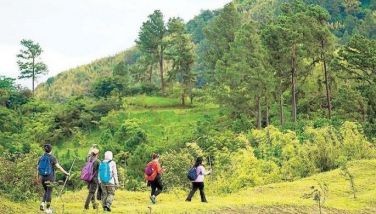Roxas Holdings tapped to oversee Luzon sugar modernization program
November 9, 2002 | 12:00am
Listed sugar firm Roxas Holdings Inc. (RHI) announced yesterday that it was appointed by the Sugar Regulatory Administration (SRA) and the Philippine Sugar Research Institute (Philsurin) to oversee the modernization of the sugar sector in Luzon.
RHI is the first partner organization of the Department Agriculture in its agricultural competitiveness enhancement fund (ACEF) program. The sugar sector modernization project component is estimated to cost P42.1 million.
The company was chosen on the basis of its own farm productivity initiatives within the provinces of Batangas, Cavite, Laguna and Quezon and its compliance with world-class sugar manufacturing standards.
In a statement, RHI president Miguel A. Gaspar said: "We are honored to be the pioneer in the government’s ACEF program and to contribute to increasing cane production in line with the food security program of the country."
Gaspar said the ACEF is a positive development for the industry and will complement the efforts of the SRA and Philsurin in the drive to increase cane production and improve sugar recoveries to make the country competitive vis-à-vis other countries around the world.
The program involves the mechanization of sugarcane farming operations of sugar farmers and the improvement of farm road networks in Nasugbu and other sugar producing areas in the whole milling district.
RHI’s Batangas sugar manufacturing plant, as the lead organization of the CADP mill district development foundation, will administer and implement the program in cooperation with various planters associations in the district.
The first phase of the program will involve the turnover to CADP of 16 John Deere farm tractors with a complete line of anciliary implements for land preparation and planting for deployment to sugar planters covering an aggregate area of nearly 30,000 hectares.
The second part of the program, on the other hand, will entail the acquisition and deployment of construction equipment that will mobilize the repair and maintenance of farm roads to improve harvesting operations, particularly during the raining season.
RHI has been renamed from Central Azucarera Don Pedro in line with its reorganization program to consolidate its sugar businesses and to transform it into a diversified holding and investment corporation.
The consolidation program involves the spin off of its Batangas sugar business to a subsidiary that will, in turn be, integrated with its 73-percent subsidiary, Central Azucarera de La Carlota. It is now in the last stages of completion.
Central Azucarera Don Pedro was founded in 1927 and was one of the first sugar mills established in the Philippines.
It was formally incorporated in 1930 and decided to extend its corporate life for another 50 years in 1980. Located in Nasugbu, Western Batangas, it began as a raw sugar factory with a grinding capacity of 1,200 TCD.
The company’s rated milling capacity increased to 10,000 TCD and its refined sugar production capacity to 14,000 Lkg. bags per day, making it one of the largest integrated sugar mills and refineries in the country.
RHI is the first partner organization of the Department Agriculture in its agricultural competitiveness enhancement fund (ACEF) program. The sugar sector modernization project component is estimated to cost P42.1 million.
The company was chosen on the basis of its own farm productivity initiatives within the provinces of Batangas, Cavite, Laguna and Quezon and its compliance with world-class sugar manufacturing standards.
In a statement, RHI president Miguel A. Gaspar said: "We are honored to be the pioneer in the government’s ACEF program and to contribute to increasing cane production in line with the food security program of the country."
Gaspar said the ACEF is a positive development for the industry and will complement the efforts of the SRA and Philsurin in the drive to increase cane production and improve sugar recoveries to make the country competitive vis-à-vis other countries around the world.
The program involves the mechanization of sugarcane farming operations of sugar farmers and the improvement of farm road networks in Nasugbu and other sugar producing areas in the whole milling district.
RHI’s Batangas sugar manufacturing plant, as the lead organization of the CADP mill district development foundation, will administer and implement the program in cooperation with various planters associations in the district.
The first phase of the program will involve the turnover to CADP of 16 John Deere farm tractors with a complete line of anciliary implements for land preparation and planting for deployment to sugar planters covering an aggregate area of nearly 30,000 hectares.
The second part of the program, on the other hand, will entail the acquisition and deployment of construction equipment that will mobilize the repair and maintenance of farm roads to improve harvesting operations, particularly during the raining season.
RHI has been renamed from Central Azucarera Don Pedro in line with its reorganization program to consolidate its sugar businesses and to transform it into a diversified holding and investment corporation.
The consolidation program involves the spin off of its Batangas sugar business to a subsidiary that will, in turn be, integrated with its 73-percent subsidiary, Central Azucarera de La Carlota. It is now in the last stages of completion.
Central Azucarera Don Pedro was founded in 1927 and was one of the first sugar mills established in the Philippines.
It was formally incorporated in 1930 and decided to extend its corporate life for another 50 years in 1980. Located in Nasugbu, Western Batangas, it began as a raw sugar factory with a grinding capacity of 1,200 TCD.
The company’s rated milling capacity increased to 10,000 TCD and its refined sugar production capacity to 14,000 Lkg. bags per day, making it one of the largest integrated sugar mills and refineries in the country.
BrandSpace Articles
<
>
- Latest
- Trending
Trending
Latest
Trending
Latest
Recommended





























